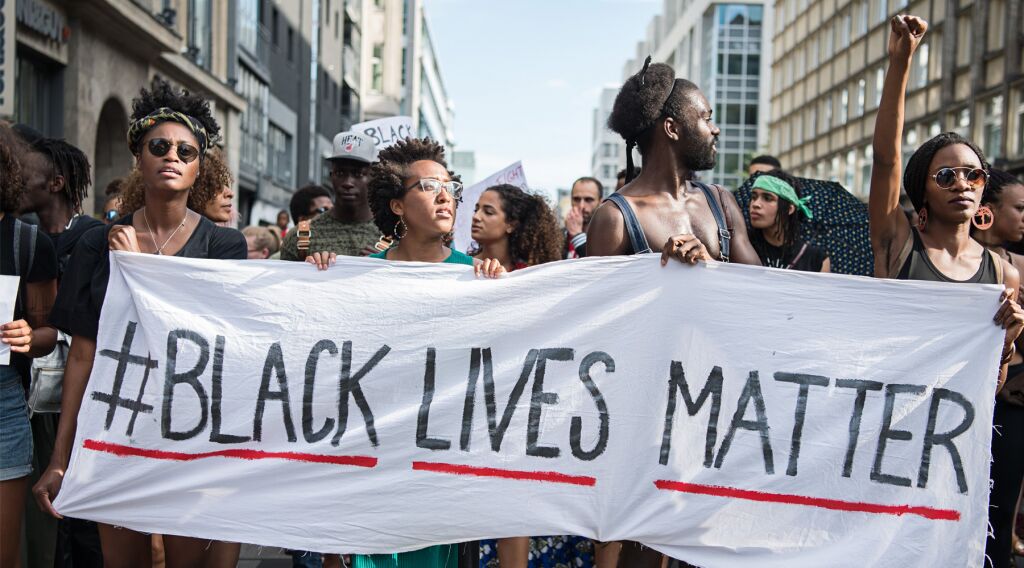
Black Lives Matter Tells America What It Wants
The Movement for Black Lives, the name for the 50 organizations representing the ideology of the Black Lives Matter movement, released its first written statement on August 1, detailing the demands and policy recommendations for the United States.
“A Vision for Black Lives: Policy Demands for Black Power, Freedom and Justice” contained six major demands along with procedures for their implementation:
1. We demand an end to the war against black people.
2. We demand reparations for past and continuing harms. 3. We demand investments in the education, health and safety of black people, instead of investments in the criminalizing, caging, and harming of black people. 4. We demand economic justice for all and a reconstruction of the economy to ensure black communities have collective ownership, not merely access. 5. We demand a world where those most impacted in our communities control the laws, institutions, and policies that are meant to serve us while recognizing that the rights and histories of our Indigenous family must also be respected. 6. We demand independent black political power and black self-determination in all areas of society.
The platform’s preamble described how “constant exploitation and perpetual oppression” could no longer be ignored by America’s elected officials and how the government should repair the damages with long-term investments. The organizations also “stand with descendants of African people all over the world in an ongoing call and struggle for reparations for the historic and continuing harms of colonialism and slavery.” Whether or not the movement stands with the millions of enslaved Europeans, Asians, Indians or Slavs (whose name became the root word of “slave” in English, Arabic and other languages) throughout history was not addressed.
Among the more absurd demands were new constitutional rights to free public education at all levels (with free day care and health services), and the elimination of all debts and halting of foreclosures for black farmers. Rights to “restored land,” an “end to the exploitative privatization of natural resources,” and reparations for oppression by “ensuring our access and control of food sources, housing and land” all sound like attacks on citizens’ fundamental property rights.
Of course, the paper wouldn’t be complete without dealing with the police; the collected activists proposed a number of ways to inhibit police effectiveness. Demands included:
The platform said it is building “on some of the best thinking in our history of struggle.” But while Martin Luther King Jr. looked to the Declaration of Independence for the promissory note of “the unalienable rights of life, liberty and the pursuit of happiness,” the new movement has displayed less admiration for America’s founders. It’s hard to see the link when a leader of the movement declared that “a constitution written by only white men will never serve the interests of black people.”
If outrage and protests are the movement’s desired outcome, then it seems it has achieved its goal in many American cities. If it is progress the movement wants, as historian Victor Davis Hanson stated, their calls for less bias and more unity are “leaving the public confused as to whether having an African-American president, attorneys general, national security adviser, Environmental Protection Agency administrator, and secretaries of education, transportation and homeland security was proof of a new fairness and inclusion or more proof that our country has a long way to go.”
Race is a highly charged subject in the United States today, and in many other nations. Past wrongs and present inequalities create fertile ground for hurt, frustration and anger. There are, though, many leaders of the black community who see where Black Lives Matter is taking their youth—and they are speaking out against it.
The emergence of Black Lives Matter is a symptom of years of racial propaganda that flows out of the higher-learning institutions in the United States. Pew Research Center’s latest poll on black discrimination showed that those more likely to say they had experienced discrimination were not the poor, uneducated black youth, rather it was the college-educated blacks, who are suddenly more aware of discrimination after being told to believe it was occurring.
Fifty years on from the civil rights movement, pockets of America are still fixated on race and oppression. It’s not a simple topic, and it won’t simply go away. If you want to delve deeper into this subject, read “The Real Agenda Behind Black Lives Matter.” You’ll see it’s not merely a call to protest, but an attack on the U.S. Constitution, the document that civil rights movements relied on for over a hundred years of progress.
